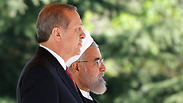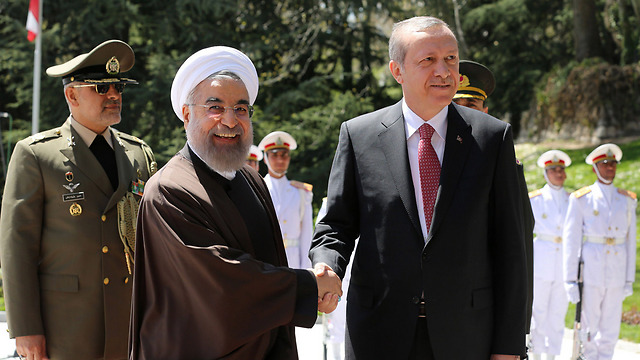
Erdogan has chosen a bride
Analysis: Following a slew of mistakes that increasingly isolated Turkey, president has turned to Iran for stability.
Turkey and Iran have been in a state of "semi-war" for three years now in Syria (where the Iranians maintain the rule of President Bashar al-Assad which Turkey has obstinately tried to remove) and more recently in Yemen, where the Turks have expressed their support for the anti-Iranian Saudi-led coalition. Despite the conflict on both fronts in question, one gets the impression that political ties between Erdogan and senior Iranian officials are at the very least normal, if not better.
Several analysts have tried to explain the Turkish president's visit to Tehran as being part of the significant economic relations between the two countries (including annual trade that reaches $14 billion). Economic benefits, however, do not explain the current situation even when we take into account the future removal of sanctions against Iran. The Turks don’t depend on the trade volume with Iran and never truly respected sanctions against the Islamic Republic in the first place.
In any case, the economic argument certainly does not apply to Israel: bilateral trade between Turkey and Israel exceeds $5 billion a year (Turkey is the seventh most important trading partner for us) and the State of Israel is currently beyond indispensable geographically speaking for Turkish trade with Jordan and partly also with Saudi Arabia. However, it would never occur to the president of Turkey to come to Israel as a sign of gratitude or an attempt to double or even triple the amount of trade. Israel would probably need more than that to bring about Erdogan’s visit (along with six of his senior ministers).
Official spokespersons in Ankara and Tehran also presented the attempt to stop the killings in Syria and Yemen as the main motive for Erdogan’s visit. Here, too, it is very doubtful that this can be considered sufficient motive. During Israel’s Operation Protective Edge last summer, there were far fewer deaths than in Syria or Yemen. Even a much higher Gazan death toll would not have convinced Erdogan to go to Jerusalem and ask Prime Minister Benjamin Netanyahu to stop the killing. Ongoing violence in the Sinai Peninsula also did not persuade the Turkish leader to visit Cairo and Egyptian President Abdel Fattah el-Sisi, whom he loathes.
Why, then, did Erdogan go to Tehran?
After 13 years in power, Erdogan feels lonelier than ever in his spacious palace. The Turkish people have elected him repeatedly throughout the years but don’t really like him. The secular Kemalists despised him since his first day in power, and two years ago the Gulenists - supporters of Imam Fethullah Gulen who lives in exile in the United States and which Erdogan accused of building a "parallel state" - also turned their backs on him. Even Turkey's Kurdish residents (about a fifth of the population) have not responded positively to the Turkish leader, despite significant gestures he made towards them in the past.
Beyond Turkey’s borders, Iraq, Syria, Yemen, Libya and Afghanistan are being destroyed. Erdogan always despised generals in power (as is the case in Egypt today) and has not given much thought to either Jordan or Lebanon. With regards to Greece and Cyprus, he continues to quarrel over the discovery of gas in the eastern Mediterranean Sea. On top of all this is his hatred of Israel, which has become his trademark. On the other hand, the beaten and bruised Hamas is his favorite and his affection for the Islamist group only served to reinforce Turkey’s isolation. Erdogan has also shown sympathy for the Islamic State group, leading to an even greater regional isolation.
In light of this sad reality, Erdogan is looking for a life partner. After making almost every possible mistake with regards to Turkey’s standing in the Middle East, he now feels the need to make a decision that will stabilize the country’s status in the region.
And hence one no longer needs a certified matchmaker here. Iran is the only proper bride for an ambitious leader like him: its leaders are certainly legitimate Islamists; there aren’t many other suitors at the moment and it actually has many assets. Disputes with Tehran still exist but this is a distinguished arrangement with potential. Erdogan decided to announce his choice following improving relations with the West (after the nuclear framework agreement), thus enabling the Turks to not pay a price for their ties with this controversial Shiite power.
The fact that Ataturk is turning in his grave only makes president Erdogan's sleep that much sweeter and calmer.
Alon Liel, formerly director-general of the Israeli ministry of foreign affairs and has served in the past as Israel's Charge d'Affaires in Ankara.
This article originally appeared on i24 News.











